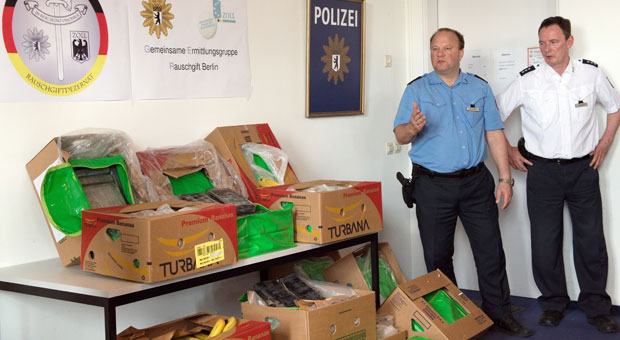Cocaine stash worth £11m delivered to Aldi
Police say smugglers made a 'logistical error' in the second accidental drug delivery to the budget supermarket

A free daily email with the biggest news stories of the day – and the best features from TheWeek.com
You are now subscribed
Your newsletter sign-up was successful
Large shipments of cocaine have been discovered in crates of bananas in Aldi supermarkets across Berlin, for the second time this year.
The drugs were found in several stores and weighed a total of 300kg, local newspaper Berliner Morgenpost reports. With an estimated street value of £11m, it's the single largest shipment of cocaine ever to be discovered in the city.
Unwitting employees discovered the narcotics while unpacking crates of fruit in stores in Berlin and Brandenburg. The drugs were said to have a very high degree of purity.
The Week
Escape your echo chamber. Get the facts behind the news, plus analysis from multiple perspectives.

Sign up for The Week's Free Newsletters
From our morning news briefing to a weekly Good News Newsletter, get the best of The Week delivered directly to your inbox.
From our morning news briefing to a weekly Good News Newsletter, get the best of The Week delivered directly to your inbox.
Police believe the smugglers made a "logistical error" en route from Colombia. "The wrong container was probably used when the merchandise was put on board the ship," police spokesperson Stefan Redlich told the RBB radio station.
"Or possibly, there wasn't enough time for the smugglers to unload it when it arrived in Hamburg," he speculated.
Drug cartels have been known to use food shipments to smuggle large amounts of narcotics from South and Central America to Europe. Last year, £1.1m worth of cocaine was found in a coffee shipment in Berlin.
This isn't the first time Aldi has received an unwanted delivery with its bananas. In January, 140kg of cocaine was discovered in boxes shipped from Colombia to Berlin.
A free daily email with the biggest news stories of the day – and the best features from TheWeek.com
-
 Political cartoons for February 16
Political cartoons for February 16Cartoons Monday’s political cartoons include President's Day, a valentine from the Epstein files, and more
-
 Regent Hong Kong: a tranquil haven with a prime waterfront spot
Regent Hong Kong: a tranquil haven with a prime waterfront spotThe Week Recommends The trendy hotel recently underwent an extensive two-year revamp
-
 The problem with diagnosing profound autism
The problem with diagnosing profound autismThe Explainer Experts are reconsidering the idea of autism as a spectrum, which could impact diagnoses and policy making for the condition
-
 Epstein files topple law CEO, roil UK government
Epstein files topple law CEO, roil UK governmentSpeed Read Peter Mandelson, Britain’s former ambassador to the US, is caught up in the scandal
-
 Iran and US prepare to meet after skirmishes
Iran and US prepare to meet after skirmishesSpeed Read The incident comes amid heightened tensions in the Middle East
-
 Israel retrieves final hostage’s body from Gaza
Israel retrieves final hostage’s body from GazaSpeed Read The 24-year-old police officer was killed during the initial Hamas attack
-
 China’s Xi targets top general in growing purge
China’s Xi targets top general in growing purgeSpeed Read Zhang Youxia is being investigated over ‘grave violations’ of the law
-
 Panama and Canada are negotiating over a crucial copper mine
Panama and Canada are negotiating over a crucial copper mineIn the Spotlight Panama is set to make a final decision on the mine this summer
-
 Why Greenland’s natural resources are nearly impossible to mine
Why Greenland’s natural resources are nearly impossible to mineThe Explainer The country’s natural landscape makes the task extremely difficult
-
 Iran cuts internet as protests escalate
Iran cuts internet as protests escalateSpeed Reada Government buildings across the country have been set on fire
-
 US nabs ‘shadow’ tanker claimed by Russia
US nabs ‘shadow’ tanker claimed by RussiaSpeed Read The ship was one of two vessels seized by the US military